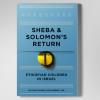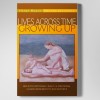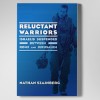11-9-05
The Ulpan was so famous, I expected more physically imposing structures, some international style of Mies, or perhaps Le Courbusier, form following function, as our mental forms would follow the function of our new language, new Semitic thoughts, biblical, spare, yet clear, unwasted breath, nomadic laconicism. Biblical brevity we learn, but such knowledge is transmitted in tin sheds, concrete bunkers with corrugated roofs, in the Mediterranean summer. Our brains have Hebrew baked into them.
Situated at the Southern tip of Netanyah, the town itself is sun-worn with streets named yearningly after the Riviera — Nice, Aixe, Provence — by French-tongued North African Jewish transplants, refugees who continue to long after La Patrie.
The school, on grounds of a half-star hotel, more a youth hostel, often sans youth, is too far to walk from downtown on baking summer days; too long to wait for the bus, a heat-beaten mini-van, still run by North African schedule, in a time warped by Camus’ sun, slowly, belatedly (in American time). The driver, should he be rushed, makes an upward gesture with his hand, fingers pursed and tips pulsating at each other as if to say, “I’m coming, I’m coming.”
From the town square, pass the beach and as the road ends, veer left onto a rutted, gravel-embedded, runkled path that bounces you to the gate, a pseudo-security, a guard in the darkened shed, acting as if he had smoked his nargilah at the last break. The gate is motorized, electrified, slides open slowly, creakily and only partially, on rusted rails.
I arrive dragging one beige Hartmann carry on. Its otherwise sturdy wheels are knocked off their tracks by the path across the campus; directed to a dorm room I am to share with a slightly outsized midget from Baltimore. The Baltimoron is a professional Jew, someone my father would have labeled in Yiddish, “a
kille grabbler,” a grabber of community funds (and a play on the word “
kille,” which would make him also a “hernia grabber.”) He arrives later; takes over the room with two oversized valises, two carry-ons, assorted bulging plastic sacks. He spreads himself about as if acquiring square meters would compensate for his challenged height. He explains brusquely: radio must play at all times; when he leaves I must leave it on, he should not return to a silent room (as if he were terrified to be alone with himself); night time radio is necessary to lull him to sleep; remains on to keep him asleep. I buy earphones for him; he refuses — uncomfortable to sleep with. He is meticulously groomed, a mustache clipped within millimeters of the line between lip and frenulum, hair parsed, shellacked into place by various pomades, gels, waxes that are aligned like tin soldiers along the bathroom shelf. He tops this “do” with a black knit kippah, adhered in place by the hair glues. Much deodorant beneath each armpit; they are frosted white. The mornings leave dust clouds trails from his Gold Bond powder scooped plentifully around his balls, his soles, between toes; needs Gold Bond’s stimulating mentholated zing. Clothes are aligned by type, color, dancing shirt-to-shirt, pant-to-pant. He buys bargain
tchatchkes, gifts, from Arab souks by the gross to bring back to Baltimore. These spill over to my sliver of closet, onto the floor. Bury my one pair of shoes. I last two days, then beg for private quarter.
I am exiled to an unused dorm unoccupied for several days until a teen group from Australia arrive, four to a room, a lively and loud collective. In early morning, they pray fervently, shaking the bleached gravely outside landing, facing East. The Ulpan, its tin, and concrete sheds, lies west of the Green Hotel The hotel of informality. One late evening, I come upon Tzakhi, the desk manager, changing his pants into shorts behind the counter, even as he attentively answers my questions. To close out the Shabbat, I ask to buy candle and wine to take to the Beach, say prayers with friends after sunset. “Buy? Buy!” he responds offended as he pulls on one leg of the shorts, then straightens himself like a gondolier. “Here. From the kitchen; just bring back.”
The Ulpan has its unique breed of cockroach, Djukim the size of fat, robust mice, but faster, tailless, silent. They prefer rooms of young women, especially those closest to the only computer terminal. Late night internet users are jarred by episodic shrieks, “Djukim! Djukim!!” as if extolling the Beatles, followed by women bursting through their doors, calling for aid. Men armed with brooms assemble, smack floors loudly, even as the we know that the lights have sent the Djukim to safer quarters.
I am placed in level Gimel Plus, pronounced “ploos.” I don’t feel very “ploos.” The class, perhaps 25, is half new olim, — adults from Caucasus, teens from Chile, Peru, Argentina, one doe-eyed boy from
Persia, sent alone, snuck out by his family. (He later, while biking, is hit by a car, is brain-dead.) One quarter are tourists from England, French; the rest of us, Americans, “Amerrikanim.” We have two teachers, alternating daily, each of whom alone could have powered the secret Dimona reactor: no need for nuclear with these two. Yonat locks the door at 800 promptly each morning. Late? See you tomorrow. (Actually, you can slink in after the first break, if you are up to weathering Yonat’s glare the rest of the day.) I inhale the learning, like Akiva the forty year old farmer who lapsup the dust written by the angel, dust that reveals all knowledge to Akiva, until erased by the Angel.
By week two, we are asked to solo, some ten minutes, in front of class, a tale, not read, spoken. I do something, now forgotten, perhaps the story of the cabbie who recites his daughter’s brain-plumbing ailment, their victory over death.
Then Pascal, Nee Pinchas. A Frenchie, delightful, of thin habitus, sharp featured, yet from somewhere a Hapsburg lip; a small kippah decorated with dentate figures clipped to his close-cropped but thick black hair, and his trim beard reveal his religiousness. Originally from Paris, he now lives with his family in London. France now too alien, too populated by rowdy Moslem teen gangs for this Jew. In France, teen thugs from Arabi gang-up on a little Jewish girl daring to wear her Magen David out; they force it down her throat, chase her home. He is here with his 11 year old daughter; wife and son are staying with relatives nearby. He carries a small pocket French Hebrew computer into which he types unknown words, surreptitiously, as the teacher frowns on dictionaries. His tale, his sport: mountain climbing, in Hebrew, he describes the almost onomatopoeic, “l’tapes,” scaling peaks. He lists five major peaks that have fallen to his tread. The last, Mt. Blanc, scaled with pickax, boots and … well, tefillin.Yes, tefillin at the summit. Only he and one guide, he details the cold final assent. They begin before dawn; rising sun reveals the narrow, one-person path with terrifying sheers on each side. At the summit, his guide, eyeing a gathering storm, whips out the camera for the token shot. But Pascal, even as blistering winds strip away his words, mimes: “Wait!” He whips out his tefillin and demonstrates to class, most of us unfamiliar with the morning ritual. He shrugs off the left parka, pulls up the thermal sleeve to bare skin to the howling mountain winds; places one box on his biceps facing his heart, another around his crown, “as frontlet between his eyes,” Torah commands. The leather straps must be wound on bare arm, biceps to the hand, about the knuckles, just so, to trace “Shadai” over the fist. He proceeds rapidly: seven windings to the hand, some boondoggling around the fingers to proclaim God. poises arm in the air, he freezes for photo. Then off with the tefillin even as they start the truly frozen descent.Delighted, we applaud. He, approaching God on Europe’s highest peak, reaches just a bit closer to Him. The Shema commands that one teach God in our home, and on our roads; on this high road, Pascal/Pinchas reaches both a personal and Jewish “best.”



